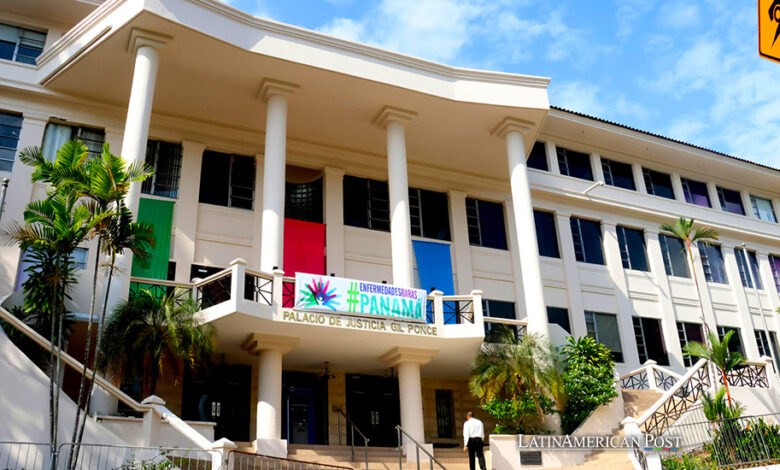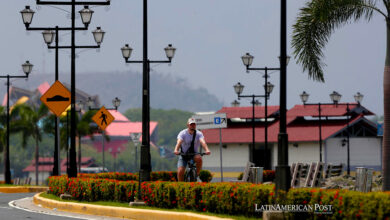Panama Papers Trial Postponement Reflects Broader Latin American Struggle Against Corruption

The repeatedly delayed trial of the infamous Panama Papers scandal, initially set to challenge global elites accused of money laundering through Mossack Fonseca, underscores the pervasive issue of corruption within Latin American judicial systems and beyond.
The Panama Papers Trial Faces Another Setback
The Panama Papers trial, a landmark case that promised to bring unprecedented scrutiny to the global elite’s financial secrecy and alleged money laundering practices, has been postponed once again by Panama’s Judicial Branch (OJ), setting a new date range from April 8 to 26. This delay, announced to the few journalists gathered at the Judicial Branch headquarters, marks yet another hiccup in a series of postponements that have plagued the case since its inception.
The trial centers around the most significant document leak in history, which exposed the intricate financial transactions conducted through thousands of offshore shell companies by Mossack Fonseca, a now-defunct Panamanian law firm. The leak implicated individuals in 200 countries and 21 financial jurisdictions, revealing a complex web of assets hidden and laundered through these entities. The case has significant implications, not just for the accused founders, Jürgen Mossack and Ramón Fonseca Mora, but for the global financial system and the fight against corruption.
The postponement comes amidst a backdrop of political activity in Panama, with the country gearing up for general elections on May 5. This political climate, coupled with the Judicial Branch’s lack of activity on the morning the trial was expected to commence, signaled the likelihood of another delay. Such continuous postponements highlight the challenges facing the Latin American region in its battle against corruption and impunity.
Latin America’s Broader Struggle Against Corruption
The Panama Papers scandal is not an isolated incident in Latin America but rather a symptom of a broader issue affecting the region. Countries across Latin America have been grappling with corruption at all levels of government and business, affecting not only Panama but also Brazil with the Operation Car Wash scandal, Argentina with the Notebooks scandal, and many others. These cases have exposed the extent to which corruption has infiltrated political and economic systems, undermining democratic institutions and economic development.
The implications of the Panama Papers and similar scandals are far-reaching, affecting not only the rich and powerful but also the average citizen. Corruption erodes trust in public institutions, hampers economic growth, and diverts resources away from public services. In a region plagued by social inequality, the fight against corruption is also a fight for social justice.
The trial’s repeated delays in Panama reflect a judicial system struggling to hold the powerful accountable, a challenge that is not unique to Panama. Across Latin America, judicial reforms and anti-corruption measures have been implemented in response to public outcry, yet progress has been uneven. The effectiveness of these efforts is often hampered by political interference, underfunding, and a lack of will to pursue high-profile cases.
The international nature of the Panama Papers scandal, involving individuals and entities from around the world, underscores the need for global cooperation in the fight against corruption. Money laundering and tax evasion are transnational issues that require coordinated efforts across jurisdictions. The case has prompted calls for greater transparency in financial transactions and the establishment of more robust mechanisms to prevent the use of shell companies for illicit purposes.
The Delayed Trial as a Symbol of Ongoing Struggle
As the Panama Papers trial awaits its new day in court, the delay serves as a reminder of the ongoing struggle against corruption in Latin America and beyond. It highlights the need for continued vigilance, reform, and international cooperation to ensure that justice is served and that the fight against corruption remains a priority on the global agenda.
The postponed trial is more than a procedural hiccup; it is a litmus test for the integrity of the judicial process and the commitment of governments and institutions to uphold the rule of law. As Latin America continues to confront its corruption demons, the outcome of the Panama Papers trial will be closely watched by those advocating for transparency, accountability, and a fairer, more equitable world.
Also read: Argentine Justice Orders Eviction of Illegally Occupied Military Lands in Bariloche
While the Panama Papers trial’s postponement may be seen as a setback in the immediate fight against corruption, it also offers an opportunity for reflection and a renewed commitment to combating corruption. The trial, when it eventually proceeds, will not only hold individuals accountable but also shine a light on the systemic issues that allow corruption to thrive. For Panama and Latin America, the path to reform is fraught with obstacles, but it is a journey that must be undertaken to secure a more just and transparent future.




